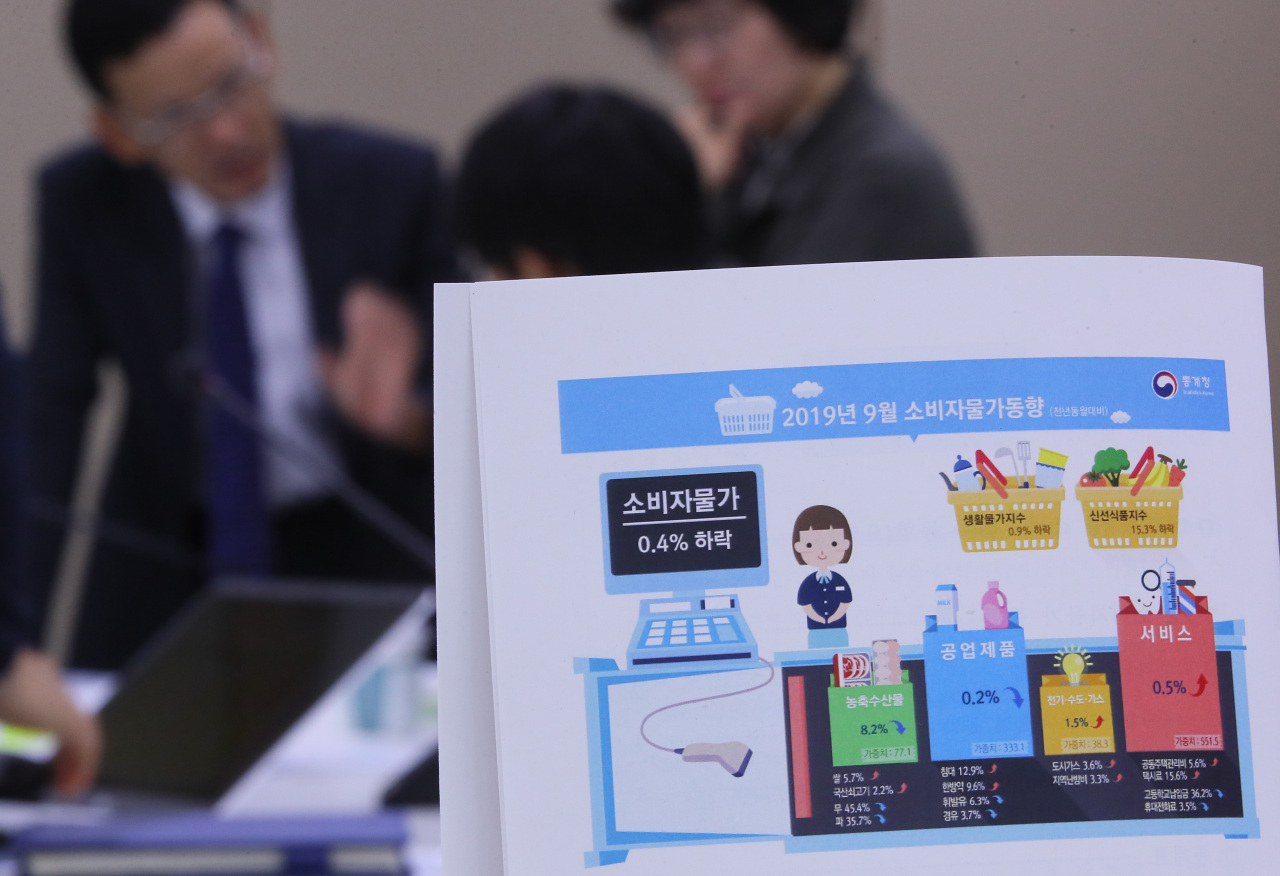S. Korea sees first negative inflation in September, denies deflation
By Bae HyunjungPublished : Oct. 1, 2019 - 16:50
South Korea saw its inflation drop for the first time in September due to weakened demand and decreased prices of agricultural and petroleum products, government data showed Tuesday.
Though the latest figures rekindled concerns on long-term deflation and speculations on an imminent rate cut, policymakers argued that recent fluctuations were only temporary.
Though the latest figures rekindled concerns on long-term deflation and speculations on an imminent rate cut, policymakers argued that recent fluctuations were only temporary.

Consumer prices slipped 0.4 percent in September from a year earlier, marking the first on-year decrease in inflation since the related data was first compiled in 1965, Statistics Korea said in a release.
“This is the first negative inflation, as it is the guidelines say that the inflation index should be rounded off to the nearest tenth in consideration of comparability and minor errors,” said Lee Doo-won, the agency’s price statistics director.
The corresponding figure for August was minus 0.038 percent, which was thus recorded as zero. The on-year inflation had been observed at 0.8 percent in January this year, and has remained in the 0-1 percent range ever since.
The record-low consumer price level was mostly attributable to the drop in prices of agricultural products and petroleum products, as well as free education for high school students, according to the statistics office.
The office, however, flatly dismissed the possibility of deflation, citing temporary policy impact and base effect from last year.
“The consumer sentiment index climbed 4.4 percent from the previous month, so this is not a deflation that results from stalled consumption,” Lee said.
“Free education programs and the base effect from (last year’s) agricultural prices have delivered temporary impact (on inflation).”
The Ministry of Economy and Finance also denied the market’s concerns over possible deflation.
“We believe that the latest consumer price trend does not indicate deflation,” said First Vice Minister Kim Yong-beom in a macroeconomic policy meeting held at Seoul Government Complex.
Core inflation -- which excludes price-sensitive agricultural and petroleum products -- rose 0.6 percent in September from a year earlier. Petroleum products and agricultural products, in contrast, fell 5.6 percent and 13.8 percent respectively during the same period, data showed.
Days earlier, Bank of Korea Gov. Lee Ju-yeol had similarly denied the likeliness of deflation, while expressing worries on the country’s growth pace throughout the rest of the year.
Despite policymakers’ assuasive moves, however, speculations have been building up that the inflation trend will push the BOK to further trim its policy rate as early as in this month’s rate-setting meeting.
The Monetary Policy Board is set to meet on Oct. 16 to decide on whether to cut the key interest rate from the current 1.5 percent.
“For now, it is difficult to pinpoint when (the rebounding momentum for the economy) might take place,” said Lee last week, hinting at the likeliness that the central bank may also reduce the growth outlook for the country from 2.2 percent.
By Bae Hyun-jung (tellme@heraldcorp.com)






![[From the Scene] Monks, Buddhists hail return of remains of Buddhas](http://res.heraldm.com/phpwas/restmb_idxmake.php?idx=644&simg=/content/image/2024/04/19/20240419050617_0.jpg&u=20240419175937)





![[Graphic News] French bulldog most popular breed in US, Maltese most popular in Korea](http://res.heraldm.com/phpwas/restmb_idxmake.php?idx=644&simg=/content/image/2024/04/18/20240418050864_0.gif&u=)


![[From the Scene] Monks, Buddhists hail return of remains of Buddhas](http://res.heraldm.com/phpwas/restmb_idxmake.php?idx=652&simg=/content/image/2024/04/19/20240419050617_0.jpg&u=20240419175937)

![[KH Explains] Hyundai's full hybrid edge to pay off amid slow transition to pure EVs](http://res.heraldm.com/phpwas/restmb_idxmake.php?idx=652&simg=/content/image/2024/04/18/20240418050645_0.jpg&u=20240419100350)

![[Today’s K-pop] Illit drops debut single remix](http://res.heraldm.com/phpwas/restmb_idxmake.php?idx=642&simg=/content/image/2024/04/19/20240419050612_0.jpg&u=)